In today’s digital age, having a strong online presence is crucial for businesses of all sizes. With the majority of consumers turning to the internet to search for products and services, it’s essential for businesses to ensure that they can be easily found by their target audience. This is where search engine optimization (SEO) comes into play. SEO is the practice of optimizing a website to increase its visibility in search engine results. While general SEO strategies are important, there is a specific branch of SEO that focuses on targeting local audiences – known as local SEO.
Implementing local SEO is a key aspect of any successful online marketing strategy. If you’re a business owner or marketer looking to take your online presence to the next level and dominate your local market, then this blog post is for you. Join us as we explore the benefits of local SEO and discover how it can transform your business.
What is Local SEO and How it Differs from General SEO

Local SEO is a specialized branch of search engine optimization that focuses on improving a website’s visibility in local search results. It is specifically designed to target users who are searching for products or services within a specific geographic location.
Unlike general SEO, which aims to improve a website’s visibility on a global or national scale, local SEO aims to connect businesses with their local audience. When users search for specific services or products in their area, search engines like Google display results that are relevant to their location.
The main difference between local SEO and general SEO lies in the intent and targeting. Local SEO is all about reaching potential customers in a specific location, while general SEO targets a broader audience regardless of their location.
72% of computer or tablet users and 67% of smartphone users want ads that are customized to their city or zip code.
Source: Think with Google
Local SEO involves optimizing various aspects of a website to ensure it ranks well in local search results. This includes optimizing the website’s content with location-specific keywords, creating and optimizing a Google My Business (GMB) profile, managing online reviews and ratings, and building citations and backlinks from local directories and websites.
Another key aspect of local SEO is the use of geo-targeted advertising. Businesses can create location-based ad campaigns to target users in specific areas and increase their visibility to local customers.
By implementing local SEO strategies, businesses can tap into the immense potential of their local market, increase their online visibility within their community, and attract customers who are actively seeking their products or services in the local area.
In the next section, we will explore the importance of local SEO for businesses and how it can provide substantial benefits in terms of local visibility, customer acquisition, web traffic, and sales.
The Importance of Local SEO to Businesses

Source: HubSpot
Local SEO plays a crucial role in the success of businesses, especially those with a physical presence or targeting customers in specific locations. Let’s explore the key reasons why local SEO is so important:
- Boosting Local Visibility
One of the primary benefits of local SEO is its ability to increase a business’s visibility in local search results. When users search for products or services in their area, search engines prioritize displaying relevant local businesses. By optimizing your website for local SEO, you can significantly improve your chances of appearing in these local search results.
Having a strong local online presence ensures that your business is visible to potential customers who are actively looking for the products or services you offer in your specific location. This increased visibility can drive more targeted traffic to your website and ultimately lead to higher conversion rates.
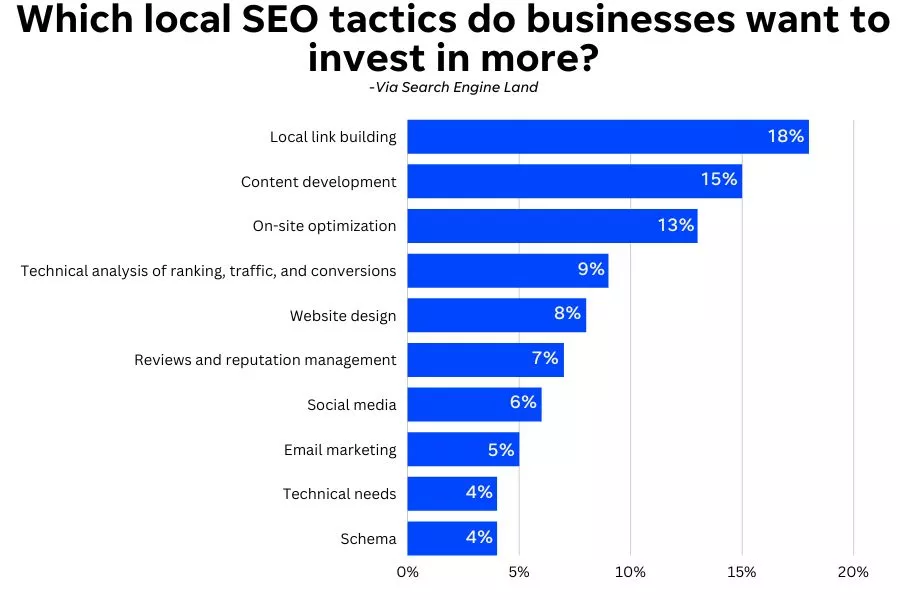
Source: Localiq
- Attracting Local Customers
Local SEO enables businesses to specifically target and attract local customers. By optimizing your website with location-based keywords, creating location-specific content, and ensuring accurate business information across online directories, you can effectively reach your target audience in your local area.
When potential customers find your business listed in local search results, they are more likely to trust and choose you over competitors who may not have optimized their online presence for local SEO. This targeted approach helps businesses connect with their local community and build a loyal customer base.
- Increasing Web Traffic and Sales
Implementing local SEO strategies can lead to a significant increase in web traffic and, ultimately, sales. When your business appears prominently in local search results, you have a higher chance of attracting qualified leads who are actively searching for the products or services you offer.
By optimizing your website for local SEO, you can drive more organic traffic to your site, increase engagement, and improve conversion rates. This can result in higher sales and revenue for your business.
How to Implement Local SEO
Implementing local SEO requires a combination of technical know-how, strategic planning, and consistent effort. In this section, we will explore the key steps and techniques involved in implementing local SEO for your business:
1. Optimizing Google My Business

Google My Business (GMB) is a powerful tool that allows businesses to manage their online presence on Google. It is a crucial component of local SEO and can significantly impact your visibility in local search results.
Here are some key steps to optimize your GMB listing:
- Claim and verify your business listing on Google.
- Ensure that your business information is accurate, complete, and up-to-date, including your business name, address, phone number (NAP), website, and business hours.
- Choose the most relevant categories for your business.
- Add high-quality images and videos that showcase your products, services, and location.
- Encourage customers to leave reviews on your GMB listing.
2. Making Use of Local Keywords

Keyword research is fundamental to any SEO strategy, and local SEO is no exception. To optimize your website for local search, it’s crucial to identify and target relevant local keywords.
Here are some tips for finding and using local keywords:
- Identify specific location-based keywords that are relevant to your business and target audience.
- Use tools like Google Keyword Planner, SEMrush, or Moz Keyword Explorer to research local keywords with high search volume and low competition.
- Incorporate these local keywords naturally into your website’s content, including headings, titles, meta tags, and throughout your website copy.
3. Gaining Reviews and Ratings

Online reviews and ratings are not only important for building trust with potential customers, but they also play a significant role in local SEO. Search engines consider customer feedback when determining the relevancy and credibility of local businesses.
Here’s how you can encourage reviews and ratings:
- Provide exceptional products or services to encourage positive reviews.
- Create profiles on popular review platforms such as Google, Yelp, and Facebook.
- Regularly monitor and respond to customer reviews, both positive and negative.
- Encourage satisfied customers to leave reviews and ratings on these platforms.
4. Creating Local Content

Creating local content is an effective way to boost your local SEO efforts. By producing informative and engaging content that is specific to your local area, you can attract local visitors, establish your expertise, and improve your search rankings.
Consider the following strategies for creating local content:
- Write blog posts or articles that highlight local events, news, or attractions related to your industry.
- Feature customer stories or testimonials from local clients.
- Create location-specific landing pages or guides that cater to the needs and interests of your local audience.
In the next section, we will explore real-life success stories of businesses that have implemented local SEO strategies and achieved remarkable results. These case studies will provide practical insights and inspiration for your own local SEO efforts.
Tools for Optimizing Local SEO:
1. Google My Business (GMB)
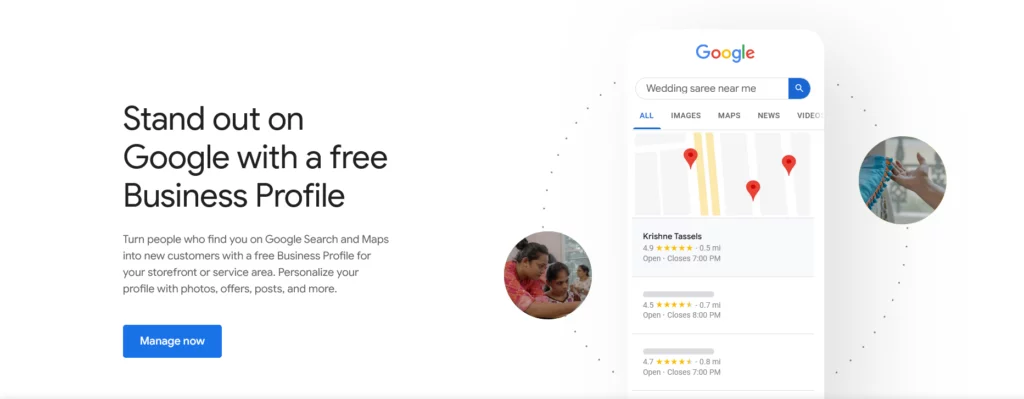
Google My Business is a fundamental tool for local businesses looking to improve their online visibility. It’s completely free and allows businesses to control how they appear on Google Search and Maps. You can provide essential information such as your business name, address, hours, and contact details. Additionally, GMB enables you to manage and respond to customer reviews and gain insights into how users interact with your business on Google.
Pros:
- Cost-effective (it’s free).
- Offers insights into user behavior.
Cons:
- Limited in its reach outside of Google platforms.
- Basic analytics compared to more advanced SEO tools.
Learn more about Google My Business here.
2. Moz Local
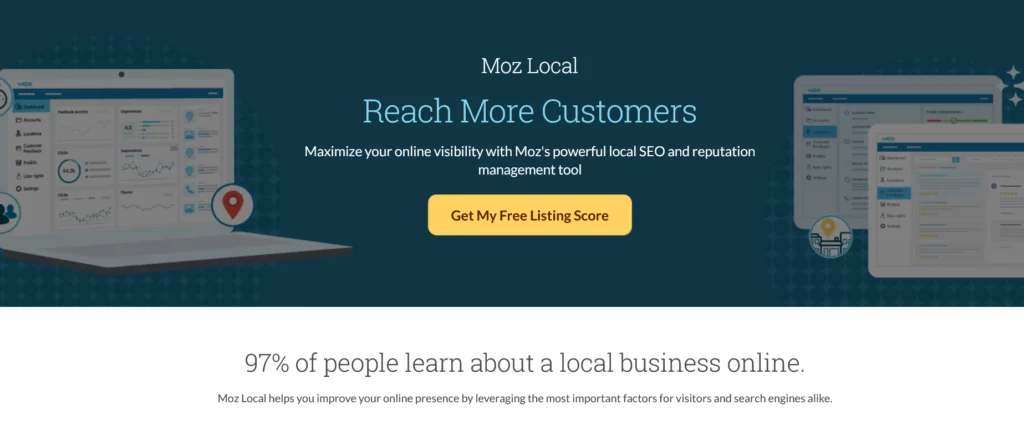
Moz Local is a comprehensive local SEO tool that helps businesses manage their online listings and improve local search rankings. It simplifies the process of listing management across multiple directories and platforms. Moz Local also provides valuable insights into how well your business ranks in local search results and allows you to monitor your online reputation.
Pros:
- Offers a comprehensive set of local SEO features.
- Helps with listings management, review monitoring, and more.
Cons:
- Pricing can be expensive for small businesses.
- Might be more detailed than necessary for some users.
Explore Moz Local here.
3. Yext

Yext is a powerful tool for businesses with multiple locations, franchises, or enterprise-level operations. It specializes in managing business listings across various platforms and directories, ensuring consistency and accuracy. Yext also provides tools for review monitoring, analytics, and insights into how customers engage with your business.
Pros:
- Specializes in multi-location management.
- Provides review monitoring and analytics.
Cons:
- Can be costly, especially for larger organizations.
- Some users might find it too complex.
Learn about Yext here.
4. BrightLocal
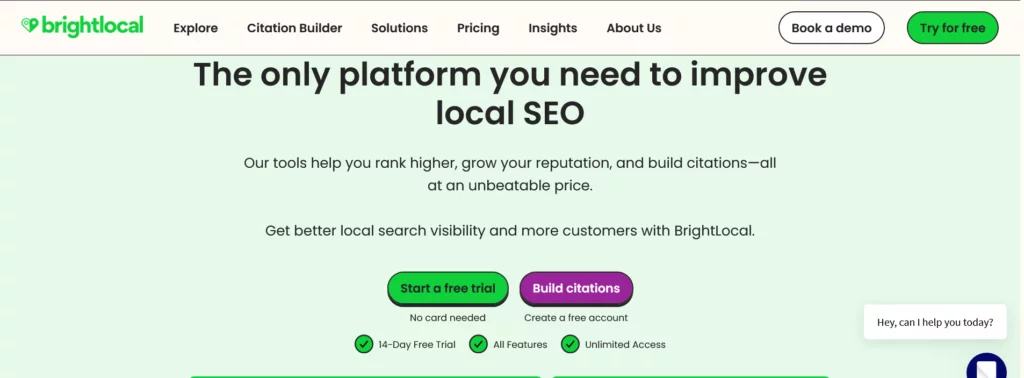
BrightLocal is a user-friendly and budget-friendly local SEO tool designed for small to medium-sized businesses. It offers a range of features, including citation building, rank tracking, and review monitoring. With BrightLocal, businesses can work on their local SEO strategies without breaking the bank.
Pros:
- Affordable and user-friendly.
- Covers essential local SEO aspects.
Cons:
- Lacks some advanced features found in more more expensive tools.
- Might not be sufficient for enterprises.
Check out BrightLocal here.
5. SEMrush
SEMrush is a versatile SEO tool that includes local SEO features as part of its comprehensive suite. It offers a broad range of features, from keyword research and competitor analysis to backlink monitoring. SEMrush is an excellent choice for businesses looking to conduct in-depth SEO campaigns.
Pros:
- Versatile with extensive SEO capabilities.
- Provides comprehensive keyword and competitor research.
Cons:
- Pricing can be prohibitive for small businesses.
- May have a steeper learning curve.
Explore SEMrush here.
6. Whitespark
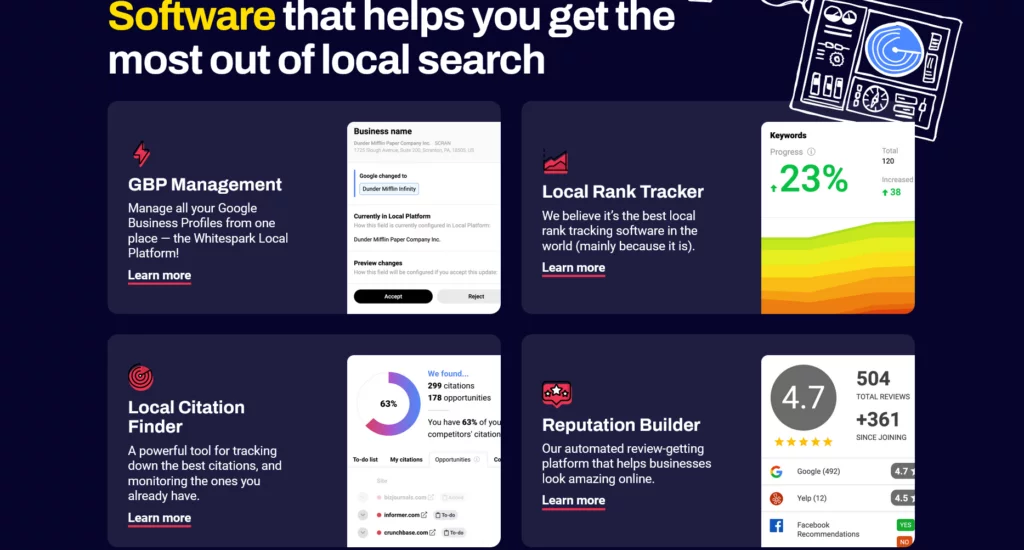
Whitespark specializes in local citation building and auditing. It’s a top choice for local SEO agencies and businesses aiming to strengthen their local online presence. The tool helps you find and monitor local backlinks and citations, which are essential for local search rankings.
Pros:
- Focuses on local citation and backlink management.
- Valuable for local SEO agencies.
Cons:
- Focused on specific aspects of local SEO; lacks some features of all-in-one solutions.
- Pricing might not fit every budget.
Learn more about Whitespark here.
7. Ahrefs

Ahrefs is primarily known for its powerful backlink analysis and keyword research capabilities, but it’s also valuable for local SEO. It helps you discover valuable keywords, assess competitors, and monitor backlinks. Ahrefs is especially useful for businesses aiming to boost their local search rankings through high-quality backlinks.
Pros:
- Comprehensive backlink analysis.
- Extensive keyword research capabilities.
Cons:
- Can be costly for small businesses.
- May offer more features than some users need.
Explore Ahrefs here.
8. Citation Builder Pro
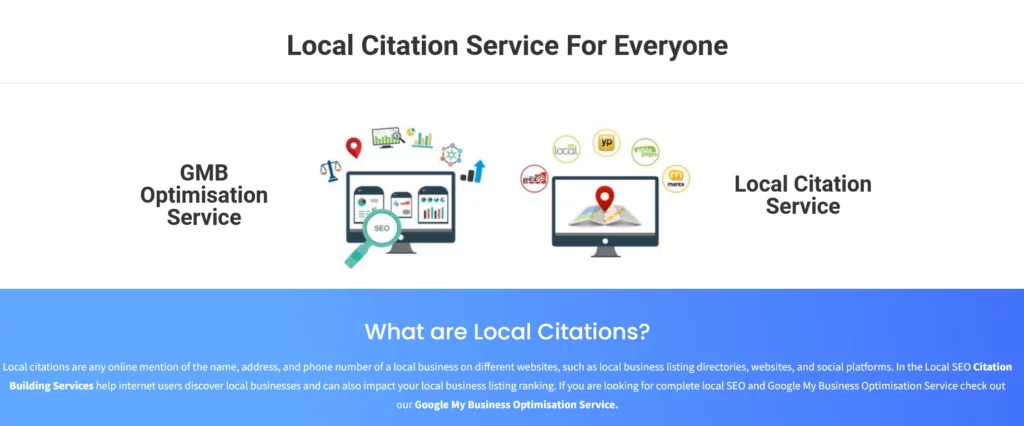
Citation Builder Pro focuses specifically on building and managing local citations. Citations are mentions of your business name, address, and phone number across the web. Having accurate and consistent citations is crucial for local SEO, and this tool streamlines the citation-building process.
Pros:
- Specialized in citation management.
- Ensures NAP (Name, Address, Phone) consistency.
Cons:
- May not cover other aspects of local SEO.
- Might be less suitable for businesses seeking a broader SEO toolkit.
Explore it here.
Factors to Consider Before Choosing Local SEO Tool:
- Your Business Goals: Consider your specific goals and objectives. Are you looking to improve your local search rankings, manage online reviews, monitor local competition, or optimize your Google My Business listing? Different tools excel in different areas, so align your goals with the tool’s features.
- Budget: Local SEO tools come in a range of price points. Some offer free or basic versions, while others require monthly or annual subscriptions. Consider your budget and whether the tool’s cost aligns with your financial resources.
- Features and Functionality: Evaluate the features offered by each tool. Common features include keyword research, on-page optimization, rank tracking, and review management. Ensure the tool has the functionality you need to achieve your goals.
- Ease of Use: A user-friendly interface is essential, especially if you or your team are new to SEO. Look for tools that have an intuitive dashboard and easy-to-understand reports.
- Scalability: Consider whether the tool can grow with your business. Some tools are suitable for small businesses, while others are more suitable for larger enterprises. Make sure your chosen tool can accommodate your business’s growth.
- Data Accuracy: Accurate data is crucial in SEO. Check the tool’s track record for data accuracy, especially in terms of keyword rankings and local search performance.
- Local SEO Focus: Ensure that the tool is specifically designed for local SEO. Some SEO tools are more oriented toward national or global SEO, so verify that the tool can effectively address local search optimization.
- Integration: If you’re using other software or platforms for marketing or website management, check if the local SEO tool integrates with your existing tools. Integration can streamline your workflow.
- Support and Customer Service: Excellent customer support can be a lifesaver when you encounter issues or have questions. Look for tools that offer good customer service and support channels.
- Reviews and Recommendations: Research the tool’s reputation and read user reviews and recommendations. This can provide valuable insights into the tool’s performance and reliability.
- Free Trials: Many local SEO tools offer free trials. Take advantage of these trials to test the tool’s functionality and determine if it meets your needs before committing to a subscription.
- Local Citations and Listings: If you are primarily interested in managing local citations and listings, make sure the tool can assist with this. Accuracy and consistency in local business listings are crucial for local SEO.
- Mobile Optimization: With the increasing use of mobile devices, check whether the tool offers features for mobile optimization and local mobile SEO.
- Competitive Analysis: Some tools provide insights into your local competitors. If competitive analysis is important to your strategy, verify if the tool offers this feature.
- Data Export and Reporting: Ensure that the tool allows you to export data and generate reports. Reporting capabilities are essential for tracking your progress and sharing results with stakeholders.
Conclusion:
In conclusion, local SEO tools are invaluable resources for businesses and digital marketers seeking to enhance their online presence and visibility in local search results. These tools offer a wide range of features to streamline the optimization process, ultimately helping businesses attract more local customers, increase website traffic, and boost revenue. By assisting with tasks such as keyword research, on-page optimization, tracking local rankings, managing online reviews, and optimizing Google My Business listings, local SEO tools empower businesses of all sizes to compete effectively in their local markets. When choosing the right local SEO tool, it’s crucial to consider factors such as budget, specific requirements, and business goals to make an informed decision that aligns with your local SEO strategy.4
FAQs on Local SEO Tools:
How do local SEO tools help with tracking local search rankings?
These tools monitor your website’s performance in local search results by tracking keyword rankings, organic search traffic, and local map pack placements. They provide reports and insights on how your local SEO efforts are performing.
Can local SEO tools assist in online review management?
Yes, many local SEO tools offer features for managing online reviews. They can help you monitor and respond to customer reviews on various platforms, which can impact your local search ranking and reputation.
Are local SEO tools suitable for small businesses?
Local SEO tools are valuable for businesses of all sizes, including small businesses. They help small businesses compete effectively in their local markets by improving online visibility and attracting local customers.



